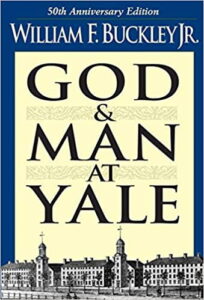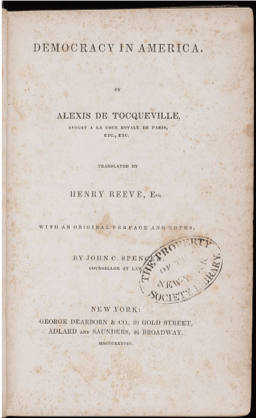Tag: American Must-Reads
American Must-Reads: God & Man at Yale
by The Cowl Editor on May 2, 2019
Literature
Life is too short to read everything. It may even be too short to major in American studies, history, or English. This column, brought to you by professors in American studies, history, and English, highlights the books you simply cannot let pass, whatever your major. Start your list!
by Dr. Eric Bennett, Assistant Professor English

Does capitalism have anything to do with Christianity? Since the faith predates the economic system by fifteen centuries, give or take, it seems strange to make the case. But in the United States during the Cold War, many Americans believed that free markets and holy scripture formed one indissoluble outlook and that communism and atheism formed another. Ronald Reagan thrived politically on that antithesis, and Paul Ryan maintained it until quite recently.
Perhaps no twentieth-century voice preached it so influentially as William F. Buckley, whose 1951 denunciation of socialism and atheism at Yale reads, in retrospect, like a blueprint for the GOP until Trump. “I myself believe that the duel between Christianity and atheism is the most important in the world,” Buckley, then twenty-four, wrote. “I further believe that the struggle between individualism and collectivism is the same struggle reproduced on another level.”
Whether you are a small government evangelical, a Catholic progressive, an atheistic humanitarian, or an agnostic MBA type, God and Man at Yale remains fascinating seven decades later. The world picture it presents, in lucid over-simplicity, has turned to mud. Widening income inequality and catastrophic environmental damage make it ever the harder to feel the clear Christian virtue in unregulated capital, while oligarchic influence across the globe cripples any argument that free markets guarantee free citizens. In the Trump era, Buckley’s screed feels like a museum piece—but one of interest to those, right or left, taking stock of the teetering order, and wondering, as the Cold War fades from memory, what comes next.
American Must-Reads: Democracy in America
by The Cowl Editor on April 4, 2019
Literature
Life is too short to read everything. It may even be too short to major in American studies, history, or English. This column, brought to you by professors in American studies, history, and English, highlights the books you simply cannot let pass, whatever your major. Start your list!
by Dr. Margaret Manchester, Assistant Professor of History
In 1831, a young Frenchman interested in sociology and political theory traveled to the United States with his companion. De Tocqueville’s main purpose was to study American prisons, but in that endeavor, he spent months crisscrossing the U.S. gathering information about its government and economy, its inhabitants and their social mores, and many other features of American life. Democracy in America was published in 1835, and it has become one of the foundational works for studies of American culture and politics.
Although he traveled during the Age of Jackson, his analysis is remarkably prescient, particularly when he discusses the long-term consequences of a racialized slavery. He argues, for example, that among the most formidable of all the ills threatening the future existence of the Union is the presence of black slaves, noting the “natural prejudice which prompts me to despise whomsoever has been their inferior long after he has become their equal” (349). In one memorable section, he travels by steamboat down the Ohio River, separating free Ohio from slave Kentucky. The stark cultural differences he notes on the two sides of the river, including an indolent southern white population benefitting from the toil of slave laborers, contrasts with the industry and energy he finds in the free state. This book, written in a lively and engaging style, is a must read for anyone interested both in the development of American institutions and the lingering issues of race and inequality.

